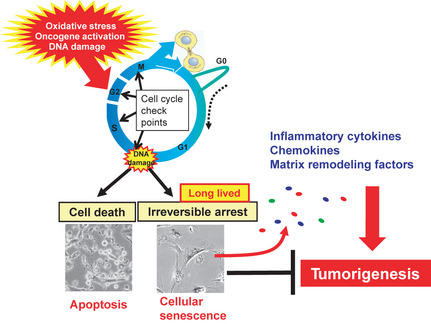Figure 4.

Senescence‐associated secretome. Irreparable DNA damage provokes either apoptosis or cellular senescence depending on the strength of stress and/or cellular context. Recently it has become apparent that long‐lived senescent cells exhibit increased expression of genes encoding a series of secreted proteins, such as inflammatory cytokines, chemokines and matrix remodeling factors, which alter the local tissue environment and/or contribute to chronic inflammation and tumorigenesis. Cellular senescence initially prevents proliferation of damaged cells, thereby acting as a fail‐safe mechanism. However, in the long term, senescent cells might eventually promote tumorigenesis by accelerating chromosomal instability and/or production of senescence‐associated secretome factors.
